The playoffs are fast approaching and I’m more excited than I thought possible. The Nashville Predators are coming in hot and have almost locked down the first place spot, but the second wild card spot is still anyone’s guess. At this moment, there are five main candidates for that spot and the competition is heating up. Will a tried and true playoff performer make the deadline, or will a newer face enter the fold? With only a few games remaining, let’s take a look at some teams who may make that spot, and how they match up against the Predators.
Los Angeles Kings
The old stereotype of the Kings being the slow and heavy team is long gone. New head coach John Stevens and assistant Pierre Turgeon have breathed new life into the Kings offense. Anze Kopitar and Drew Doughty have reached new heights as offensive dynamos, and the rest of the team has prospered.
While no one will get close to the 75 points Kopitar has amassed, Tyler Toffoli and Tanner Pearson are getting better and better as the season has gone on, as they have 40 and 34 points, respectively. Lost in all the production is former captain Dustin Brown. While he’s been known to throw a knee on knee hit more often than scoring a goal in the past few years, this season has brought on a resurgence. He sits second on the team in points with 20 goals and 46 points, and is once again a viable power forward.
Goaltending hasn’t been an issue for the Kings, as both Jonathan Quick and Jack Campbell have above a .920 save percentage. Both get relatively decent help from the defense, as they’ve given up the 15th-most high danger chances at five on five, or 16th-fewest depending on your perspective.
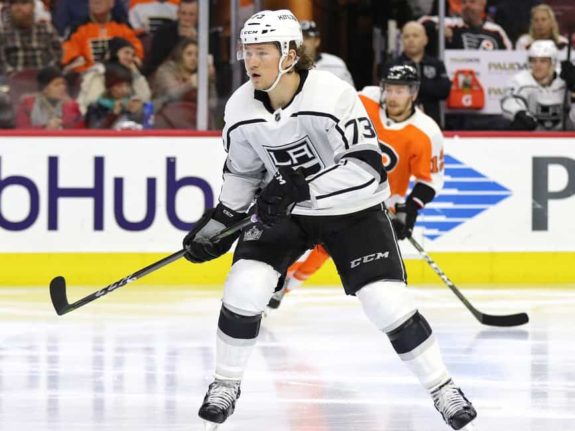
As Darryl Sutter left, he apparently took his possession domination with him. The Kings now own a 49.98% Corsi and a 49.56% Fenwick, good for 16th and 18th in the league, respectively. That’s not bad but it’s just below average. The Kings have decided to forego possession to focus on transition offense. They’ve decided that the risk of surrendering chances is outweighed by their ability to create offense off the rush. This often requires Doughty or Alec Martinez to leave their post and jump into the play.
The Kings might not even meet the Predators, as they sit in the third spot of the Pacific Division, but the Anaheim Ducks are actually tied in points. One bad stretch of four or five days could be the difference between third in the division, a wild-card spot, and sitting outside the postseason. If the Kings and Predators do meet, the Kings could pose a serious threat. Quick has stolen an entire playoff series before and could do it again. I can honestly see a playoff series where the Kings win every game one to zero. On the other hand, the Predators could very easily make the Kings’ style of transition offense work against them. P.K. Subban and Roman Josi are so good at stepping up at the blueline that they could break up odd-man rushes before they happen.
I still would favor the Predators in this series, but the Kings could leave them black and blue for the second round.
Colorado Avalanche
The Colorado Nathan MacKin- I mean the Colorado Avalanche have surprised everyone this year. After a historically terrible year, the Avalanche have rebounded to make the wild card. Head coach Jared Bednar has impressed after having longer than two weeks to prepare for the season this time around. The Matt Duchene trade has weakened their center corp, but Tyson Jost and Alex Kerfoot have stepped up to fill the void.
How can you mention the Avalanche without talking about Nathan MacKinnon? The second-best player from Cole Harbor has set the world on fire with 82 points in 61 games, and a probable Hart Trophy candidacy. Riding alongside MacKinnon is Mikko Rantanen, who’s certainly not a passenger. Their style of play has complemented each other greatly, as Rantanen has 70 points in 68 games. Otherwise, Gabriel Landeskog, Samuel Girard, and Tyson Barrie have been incredible. Expect Barrie to make a huge impact, as long as he’s healthy.
Goaltending might be an issue for Colorado. I’m not saying Semyon Varlamov and Jonathan Bernier are bad goaltenders – both have a .913 save percentage – but both are inconsistent at best. Varlamov can show signs of Vezina-level goaltending, but he’s been nursing a groin injury for the past few years. Bernier is fine, but Predators’ fans will remember him from Game 6 against the Ducks where he laid an egg.
The Avalanche are, quite honestly, a terrible possession team. They’re not riding a sky-high PDO like in 2013, but the possession scores look similar. The Avalanche have a 47.59% Corsi and a 47% Fenwick, both of which are in the bottom five of the league. What’s worse is that Colorado controls only about 45% of the high danger chances. What saves this franchise is that the Avalanche are shooting 14% from high danger areas. It might be played out, but this looks unsustainable.
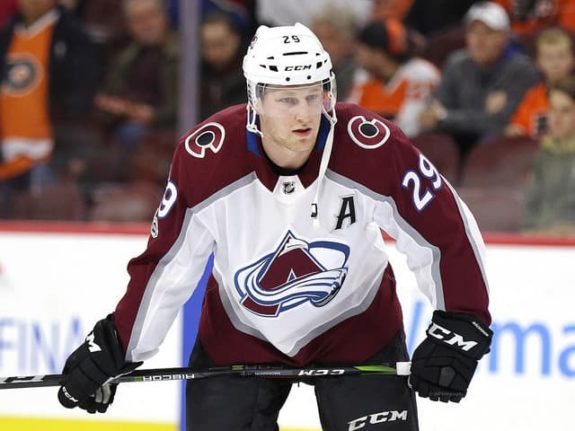
The second wild-card spot is highly contested and there’s no one sitting in a hotter seat than the Avalanche. They’re two points behind the first wild card and five points out of the third spot in the Central. It’s unlikely that they catch either, but they could hold onto their current position, as long as their luck holds up. Predators’ fans should rejoice if these two clubs meet, as the Avalanche are probably the weakest of the playoff teams.
I would pick the Predators in five or six, as MacKinnon will probably steal a game or two.
Dallas Stars
This is my sleeper pick for the playoffs. The Dallas Stars are one of the best defensive teams while featuring one of the best top lines in hockey. Jamie Benn, Tyler Seguin, and Alexander Radulov are offensive dynamos and can take over a game in an instant. The real story is Ken Hitchcock, who pretty much came out of retirement to lead the Stars back to the promised land, just as he did once before at the turn of the century. To see his influence, check out the two heat maps below. Before Hitchcock on the left and after on the right.


Besides the big guns on offense, my personal favorite Norris candidate sits on the blue line. John Klingberg is having a career year on offense and defense. He’s fourth on the team with 58 points in 71 games, with 37 coming at even strength. Otherwise, Julius Honka and Esa Lindell have stepped up and played exceptionally well. What was once a joke, is now one of the better defenses in the league.
Remember a year ago when the Stars were icing Kari Lehtonen and Anti Niemi? Fun times for the rest of the Central Division, but not really for Stars’ fans. Well, Ben Bishop has seemingly solved those woes, although both goaltenders have benefitted from better defense. Bishop carries a .917 save percentage in 51 games and Lehtonen has a .915 save percentage in 28 games. Bishop has struggled with injuries recently but is set to come back before the end of March. His silent but excellent play could push the Stars into the third spot in the Central.
Dallas is a top-10 possession team and is better than the Predators in some instances. They own a 51.45% Corsi and a 51.73% Fenwick, which lends to the Stars’ ability to block shots. The Stars swarm teams and keep them to the outside, except for the top of the left circle, which is a medium danger area. In terms of the NHL, the Stars are THE high-danger team. They have the best high-danger chance share, mostly because they’ve given up the fewest in the league. Otherwise, they’ve produced the 12th most, which is above average.
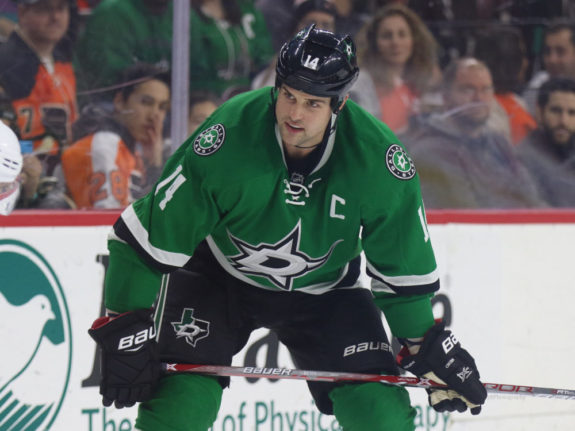
If I’m sitting in the playoffs right now, I’m praying that the Stars somehow fall out of the picture. This club could easily surprise everyone and make a Cup run.
Anaheim Ducks
The most hated team in the league is probably the Predators’ biggest rival. Not in the sense that these two are equal in skill, but more so that whenever they play it devolves into a bloodbath. These two clubs hate each other, and Ryan Johansen said it best when he chirped at Ryan Kesler, “you’re a (expletive) loser, no one likes you.” While the Ducks’ forward corp is aging, the defense is young and dominant. Cam Fowler and Josh Manson are two of the better offensive defensemen in the league, while Hampus Lindholm is in contention for the title of best shutdown defender in the NHL at the ripe young age of 24.
Rickard Rakell is leading the Ducks in scoring with 30 goals and 59 points in 65 games. He’s been a dynamic player in any situation or role. He’s an elite scoring threat who can anchor a line at center, or focus on offense as a wing. Speaking of centers, Ryan Getzlaf has had another phenomenal season under the radar. The playmaker has 41 assists and 51 points in 45 games, and has been dangerous. No one seems to be talking about him, but the 32-year-old is showing no signs of slowing down. While Kesler will be attempting to shut down the Predators, Getzlaf will be looking to light them up. Otherwise Ondrej Kase, Jakob Silfverberg, and Adam Henrique are all dangerous threats that can score at a moments notice.
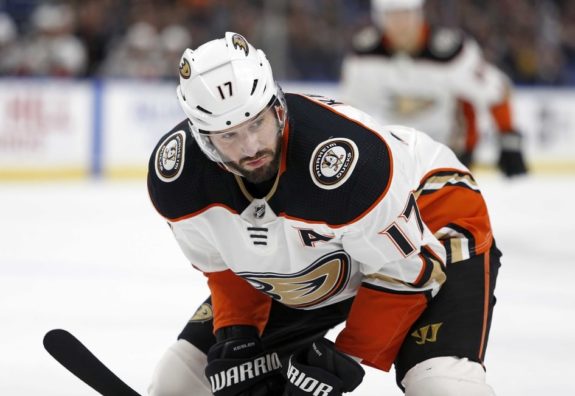
The Ducks have some interesting stats, but it’s mostly because of the injuries that plagued the franchise for the better part the first four months. Having Randy Carlyle as a coach doesn’t help either, but the poor stats are not solely on him, this time. The possession gods have not smiled upon the Ducks as they own a Corsi of 48.21% and a Fenwick of 48.13%. Those are good for 23rd and 21st in the NHL. Not awesome, by any means, but the Ducks hang in there by relying on the red-hot goaltending of John Gibson and Ryan Miller. The Ducks otherwise control only about 48.06% of high-danger chances, and have only produced the 16th most. That’s still better than the Predators, who have created the 22nd-most high-danger chances. But it’s not great.
If I’m the Predators, the Ducks are the team I want to face the least. While I think the Predators are quite a bit better, this series would leave both teams in slings and casts. I think the over/under of how long it’d take for a fight to break out would be around five minutes. These two teams absolutely hate each other, and while it could give fans the best series of the playoffs, it may leave the victor too weak to continue. Last year, the Ducks left the Predators without Johansen and Mike Fisher, and it essentially crippled their offense. Nashville should sacrifice any offering to the Hockey Gods to avoid the Ducks.
Minnesota Wild
I have a bit of a prejudice against the Minnesota Wild. It’s not that I hate them, it’s just that I never consider them a threat. They could win all 82 games in a season, and I’d still predict them to lose in the second round. Luckily for the Wild, the team that has haunted them, the Chicago Blackhawks, are not in the playoff picture and can no longer play spoiler. Nevertheless, the Wild are a weird team with some great players, and quite a few mediocre ones.
Eric Staal for Hart!!! Maybe that’s an insane argument to make, and it has little merit, but Staal is having a resurgence. He has 37 goals and 68 points in 70 games, and has once again become the dominant first-line center that we all knew in Carolina. The defense has stepped up as well, as the young duo of Matt Dumba and Jared Spurgeon have combined for 75 points in 131 games. Recent news has come out that Spurgeon will miss at least four weeks with a gruesome hamstring injury, which will be a huge blow to the corp. Other than those two, Ryan Suter is still continuing a career filled to the brim with silent excellence. Goaltending hasn’t been as good as seasons past, with Devan Dubnyk owning a .915 save percentage and Alex Stalock having a .912 save percentage.
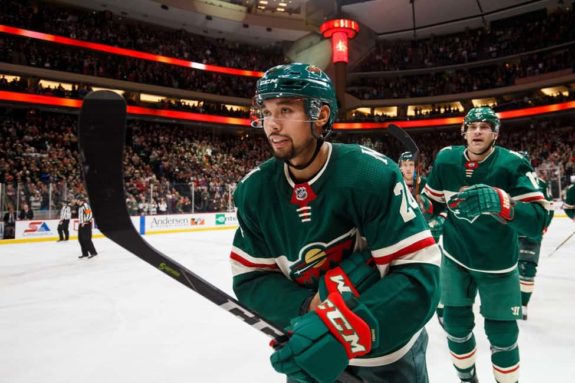
The Wild are a bottom feeder possession team, with a Corsi of 47% and a Fenwick of 48.01%. That’s a pretty big jump from the attempts to unblocked attempts, but it’s not without reason. Bruce Boudreau is one of the best at keeping other teams outside the high danger areas, that’s why they have the second-best high-danger share in the NHL with 55.45%. The Wild’s strength is their defense, they have allowed the fourth-fewest high-danger chances, much better than the Predators who’ve given up the 14th fewest.
A playoff series between these two teams might be a boring one. The Wild can suffocate even the best teams in the NHL, and the Predators will have to work their butts off to get even two or three goals a night. Stout defenses win championships, but I’m not sure the Wild have enough firepower to score more than one or two goals per game in a playoff scenario. This would be a favorable situation for the Predators. My pick would be Predators in 5.